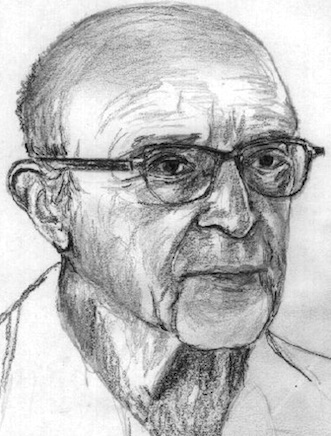On this date in 1902, humanist psychologist Carl Ransom Rogers was born in Oak Park, Ill., one of five children of Walter and Julia Rogers. His conservative Protestant parents created a home filled with prayer and protection for their children from society’s influences. With few outside friends, Rogers led a quiet, sheltered life, reading and studying. Able to read before age 5, he skipped kindergarten and first grade and started school in the second grade.
Enrolling at the University of Wisconsin-Madison, Rogers decided to study agriculture. He then changed his major to history and then to religion, intending to become a minister. While on a trip to China for an international Christian conference, Rogers started to doubt his religious convictions, although it took two years in seminary before he left his religious track. Rogers obtained his M.A. in education from Columbia University in 1928 and his Ph.D. in 1931. While working on his doctorate, he was involved in child studies at the Society for the Prevention of Cruelty to Children in Rochester, N.Y., becoming the center’s director.
He began to engage in a new, humanistic approach to psychotherapy and in 1939 wrote his first book, “The Clinical Treatment of the Problem Child. He became a full professor at Ohio State University and, in 1942, wrote a second book, Counseling and Psychotherapy: Newer Concepts in Practice, wherein patients could gain the necessary insight to restructure their own lives in conjunction with an empathetic therapist. The premise of self-help and self-understanding was contrary to prior clinical methodologies, in which the psychologist told the patient what to do.
In 1945 he was asked to begin a new counseling center at the University of Chicago and, in 1951, published his groundbreaking work Client-Centered Therapy. Rogers became president of the American Academy of Psychotherapists in 1956 and a year later returned to UW-Madison to work in the psychology department. After becoming disillusioned with academia, he moved to La Jolla, Calif., in 1964, where he worked on the staff at the Western Behavioral Sciences Institute. In 1964 he was named “Humanist of the Year” by the American Humanist Association. He remained in La Jolla for the rest of his life.
Rogers wrote numerous journal articles and 16 books, the best known being On Becoming a Person (1962). He traveled worldwide to promote his theories in the areas of education, the social sciences and in national social conflict, specifically focusing his efforts on leading encounter groups between people of conflicting political factions.
He was nominated for the Nobel Peace Prize in 1987 for his work with international intergroup conflict in South Africa and Northern Ireland. He died of a heart attack at age 85 in La Jolla. (D. 1987)


